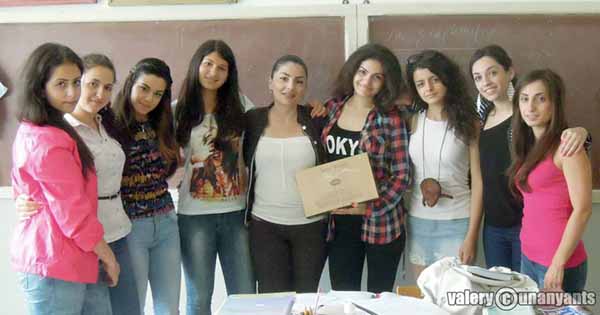Learning Armenian in a month

The 2015 “Diaspora” Summer School Program is in full swing. It kicked off with an accelerated Armenian language course that has brought together more than 126 Armenians around the world. Teacher of Eastern Armenian Arus Hovhannisyan, who also teaches at Armenia’s Yerevan State University, regrets that the children in her group have a quite low level of Armenian language proficiency, and there are many reasons for that. “The children in my group are mainly from Russia and Ukraine. True, the children mastered the Armenian alphabet in three days, but there is still a lot of work to do. The Armenian language is like an ocean-you can’t see the bottom no matter how deep you go. I started by teaching them the most ordinary words like water, bread, house, flower, mountain and more,” Arus Hovhannisyan mentions. When asked what the reason for the children’s low level of proficiency is, Arus Hovhannisyan says: “We have joined the Ministry of Diaspora in working with all Armenian communities. There are brilliant teachers at Armenian daily and Sunday schools in the Diaspora who do everything they can to help preserve the Armenian identity and the purity of the language, but there aren’t many students. They’re not consistent, and all that undoubtedly comes from the family and the environment, which change an adolescent’s world views. The child still doesn’t understand what national identity is, how important it is, and they automatically become detached from their roots and, most importantly, they lack knowledge of the mother language.”
Sofik Baghumyan, teacher of one of the other groups of children participating in the accelerated Eastern Armenian language course, has been working with Diaspora Armenian youth and has been teaching them the mother language since 1968. “My students are also mainly from the Russian Federation, and some are from Georgia, but they still don’t have much knowledge of Armenian compared to the children from the Armenian communities in the Near East.” Mrs. Baghumyan went into more detail about the causes and effects. “The Armenian community of Russia was established throughout the past 15-20 years, and people face the issue of integration. They do their best to integrate into the foreign environment, and this makes them forget the language. Parents think their children will become more integrated if they speak less Armenian and communicate more in the foreign language. It seems as though they are unconsciously making children feel inimical towards the mother language.”
According to the expert, another problem is that most parents who have just moved to a foreign country and don’t know the foreign language try to teach their children attending foreign schools certain words and start communicating with them in that language, making the children forget their mother language. However, Mrs. Baghumyan said she was pleased to mention the fact that the children are quite interested and want to learn and that teachers must simply try to spark the interest among children who aren’t participating in the summer school program.
When asked how this program helps, Mrs. Baghumyan mentioned: “It definitely helps. First, they learn the basics, acquire communication skills to express themselves by using the simplest words and try to communicate in Armenian. Thus, the mother language doesn’t seem to be a foreign language for them anymore. There is no other way. We need to preserve the language. Abovyan was right when he said language is the basis and faith of a nation. In our days, language comes first.”
True, a month is not enough, but the children are so interested and willing that it seems as though nothing can stand in their way. We’re learning Armenian in a month.




 Արևելահայերեն
Արևելահայերեն Արևմտահայերեն
Արևմտահայերեն Русский
Русский






